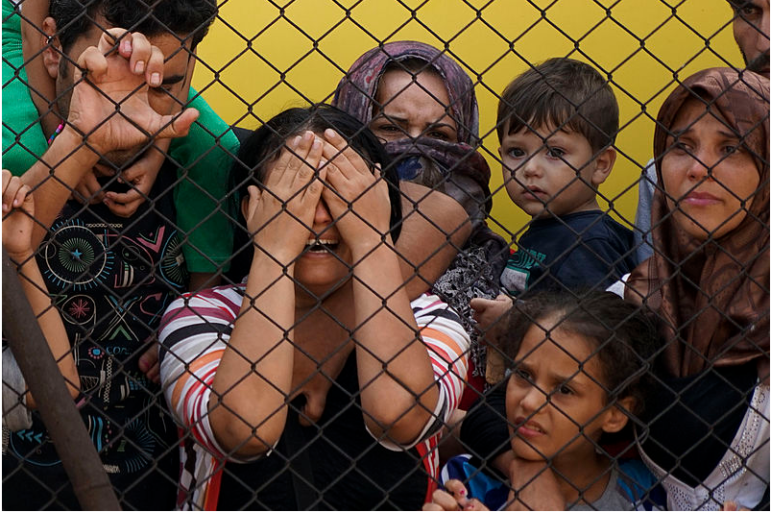
MANCHESTER, NH – A discussion during the Nov. 17 Mayor and Board of Aldermen meeting over the Syrian refugee crisis took a wide turn after comments by Manchester Chief of Police were “blown out of proportion.”
“I am actually sending out something to clarify my comments,” said Chief Nick Willard on Wednesday. He was asked to weigh in on the conversation during the Tuesday night BOA meeting.
In that clarification, Willard said when he told the BOA 500 refugees may be coming, he meant to New Hampshire, not Manchester, and that number was representative of all refugees from a variety of countries, not just from Syria. Willard said his figures came from two NH resettlement agencies, Ascentria Care Alliance and International Institute of New Hampshire.
Although Willard says he cautioned the board before making his remarks, that his information was based on an informal discussion with the Federal Bureau of Investigation, the content and intent of the information was ultimately misunderstood and misconstrued, he says.
No, 90,000 Syrian refugees are not coming to the United States, and 500 of them will not be settling in Manchester.
The actual numbers of Syrian refugees who will be accepted into the U.S. has been established by President Obama who in September announced that in response to the humanitarian crisis there, the U.S. would increase the number of incoming Syrian refugees going forward, from 2,000 to 10,000 for fiscal year 2016.
Between 2012 and 2015 the U.S. has allowed fewer than 2,000 total Syrian refugees.
During Tuesday’s meeting Alderman Keith Hirschmann made a motion for the board to support Gov. Hassan’s stance, who has said publicly that she is against accepting Syrian refugees into New Hampshire.
The board voted down the motion during a roll call vote, 8 to 3, with Aldermen Bill Barry, Dan O’Neil, Tom Katsiantonis, Normand Gamache, Pat Long, Jim Roy, Tony Sapienza, and Garth Corriveau voting against it; Aldermen Hirschmann, Joseph Kelly Levasseur, and Barbara Shaw voting in favor; and Aldermen Joyce Craig, Bill Shea and Ron Ludwig abstaining.
“I abstained because this is a state and federal issue. The numbers provided by the Mayor and others were inaccurate. The wording of the motion was fluid – it started out one way and ended very differently. We were being asked to vote without adequate information on something we have no control over,” said Craig, following the vote.
Alderman Bill Barry said his reason for voting “no” was that the numbers discussed during the meeting didn’t add up for him.
“I also believe city and state officials can’t dictate who can come to the city of Manchester. That’s a federal issue,” Barry said.
Jeffrey Thielman, Executive Director of the Boston-based International Institute of New England, says he’s not surprised to hear there is misinformation circulating, in that there is no shortage of myth and widespread panic to go around following last week’s terrorist attack on Paris as communities around the country discuss public safety issues.
“The fact is the President of the United States approved the resettlement of 10,000 refugees from Syria this coming year, increasing the number due to the crisis. The process for refugees is a long one. They must be selected to come here by us, and they must go through multiple checks along the way – refugees are the most-vetted travelers to the U.S., more vetted than students coming on college visas, or tourists,” says Thielman.
⇒Click here to review the refugee screening process
“Governors may be trying to press the President into not letting them in, but the governor of New Hampshire can’t close your borders,” says Theilman.
Once refugees arrive here and pass all security and clearance hurdles, settlement agencies like IINE’s Manchester-based satellite office, International Institute of NH and Ascentria Care of Concord, go about the work of resettlement, finding housing, jobs and getting kids settled into schools.
“It’s a lengthy and thorough process, and over time, we find that many go on to become Americans and contribute to American life,” says Thielman.
As we know from history, fear has led the United States down similar paths, says Thielman.
“Don’t forget, we also had Japanese internment camps during WWII, after the bombing of Pearl Harbor, which people later regretted. Collectively as a nation we’ve apologized for that because we made a terrible mistake and acted out of fear,” Thielman says. “Leadership requires us not to act out of fear but to look at the facts, and the facts are refugees are the most vetted people entering our country.”
⇒Related story: Refugees in crisis: A NH man bears witness
He says statements about “being careful” with Syrian refugees or stopping resettlement altogether are not rational, and anti-Muslim.
“This is a lengthy process. It will take years to complete the resettlement process here. We’re not in Germany, where Syrians are pouring over the borders. We’ve accepted fewer than 2,000 Syrians in the past year. That’s a drop in the bucket, less than one-tenth of 1 percent,” Thielman says.
Currently the IINH has submitted an application through the United States Committee for Refugees and Immigrants (USCRI) to the U.S. State Department’s Bureau of Population, Refugees and Migration (PRM) for 200 total refugees to be resettled in Manchester in the coming year. The number of those that would be from Syria is not known, yet, Thielman said.
“There are nine networks that resettle refugees, that meet weekly in Washington, D.C., and the names of the refugees come in through the state department. At that point, they are selected to go to different parts of the country based on where the organizations think there is a good fit,” says Thielman.
In addition, the resettlement process includes a cultural orientation program overseas that refugees must go through before coming to the U.S.
“We are selecting people who’ve been tortured, who’ve suffered greatly – they’re running away from the very violence you saw in Paris, trying to escape ISIS, people who want to make it in the U.S., just like other refugees have for forever,” Thielman says.Q&
Separating Fact from Fiction: A Q&A on NH’s refugee resettlement process
MYTH: Refugees do not pay taxes.
FACT: Refugees are subject to the same employment, property, sales, and other taxes as any U.S. citizen. Refugees cannot vote until they become a citizen, however.
MYTH: Refugees receive special money from the U.S. government to purchase homes, cars, and other items.
FACT: The U.S. Government provides about $1,000 per person when refugees arrive in the U.S., however, there are minimal benefits available for emergency situations and the medically needy. The refugee must apply for these benefits and meet income and resource standards to qualify for any assistance. They must also pay their own way for flights into the U.S., sometimes requiring them to take out loans.
MYTH: Refugees come to the U.S. for economic reasons.
FACT: Refugees are individuals or families who have come to the U.S. because they were forced to flee their homeland, many times with little or no belongings, leaving family and friends behind and are unable to return. Most refugees would rather live and work in their native country.
MYTH: The United States is the only country to accept refugees.
FACT: There are 24 countries worldwide involved in refugee resettlement. The major resettlement countries include: Australia, Canada, China, France, Germany, United Kingdom, and the United States.
MYTH: It seems like New Hampshire resettles all of the refugees.
FACT: Refugees have resettled in every state and several territories of the United States. In 2012, of the 58,236 refugees admitted into the U.S. 365 were resettled in New Hampshire, which ranked 33rd among all states.
MYTH: Refugees do not contribute or participate in society.
FACT: Refugees contribute a great deal to this country through the sharing of their talents, skills, cultures and customs. History indicates that some of our most significant contributors to the U.S. have been refugees and immigrants. And, as noted previously, refugees do pay taxes.
MYTH: Refugees represent a health hazard to the American public.
FACT: There are refugees who have health problems which area a result of the lack of medical care that existed in their country of origin or due to problems they encountered during their flight from persecution. Most health problems are addressed by health care services in first-asylum camps and in refugee processing centers before refugees are admitted to the United States. The Centers for Disease Control closely monitors all admissions and prevents the admission of certain persons with health conditions identified as hazardous to the public until they are treated and no longer considered to be infectious.
MYTH: Refugees represent only a few nationality groups.
FACT: Each year the President and Congress determine the countries of origin and the number of refugees who will be admitted into the United States. Since 1997, refugees from over 30 different nations have arrived to New Hampshire.
MYTH: Refugees Are Another Drain On The Welfare System.
FACT: The New Hampshire Refugee Resettlement Program supports programming to place refugees into jobs that promote economic independence, generate tax dollars, and help local economies. The use of welfare-type funds is on a short-term basis.
 You’re one click away! Sign up for our free eNewsletter and never miss another thing.
You’re one click away! Sign up for our free eNewsletter and never miss another thing.







